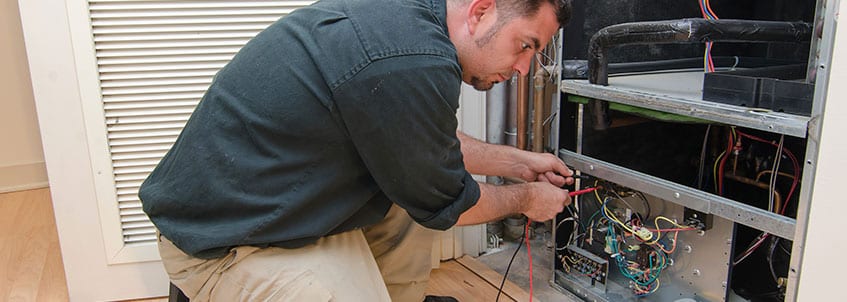
Career training for a job in the HVAC field
In this hands-on HVAC job training program, you’ll get the skills you need for a job installing or servicing air conditioning, ventilation, or heating units. You’ll learn safety, hand tools, basic electricity, equipment, and plumbing related to HVAC maintenance and repair. In addition to working with tools and HVAC equipment, you’ll learn the fundamental concepts of refrigeration, ductwork, silver brazing and soldering. Upon graduation, we’ll help you find a job in the HVAC field.
What you’ll learn in the HVAC Specialist job training program:
- Introduction to HVAC
- Saftey
- Hand Tools
- Piping Systems
- Electricity
- Heating Systems
- AC Systems
- Refrigerant Recovery
- Duct Work
- Basic Computers
- Job preparation, including interview and resume skills
Say Yes to CET HVAC Specialist!
| New career in 7-8 months?* | yes! |
| Job Placement Assistance? | yes! |
| Support Services? | yes! |
| Financial Aid Assistance for those who qualify? | yes! |
| Training Supplies, books and uniforms included at no additional charge?** | yes! |
*Average program length based on attendance. ** Subject to change without notice.
FAQ about HVAC job training program:
- Where do the HVAC Specialist job training classes take place?
- On CET’s campus in Alexandria, VA. In addition to the classroom learning, you’ll have access to a fully working lab for hands-on learning. You’ll work with actual residential and commercial HVAC systems for tear down, rebuilding, installation and troubleshooting.
- How long does it take to finish the HVAC Specialist job training program?
- With 30 hours a week of attendance, students usually finish the 780 hour program in 7-8 months. We also have a 25 hour course available - ask an Admissions Advisor for more info.
- When does the next HVAC specialist class start?
- Right now! CET’s open enrollment means once your application is completed you can start the next day.
- After taking HVAC classes, what types of jobs can I find in HVAC?
- When you’re trained as an HVAC technician, you’re qualified for a variety of entry-level jobs in the HVAC field, including:
- HVAC Installer/Service Technician/Helper
- Refrigeration Mechanic/Repairer
- Air Conditioning Installer/Service Technician
- Commercial/Residential HVAC Installer/Service Technician/Helper
- How soon after graduation will I start working in the HVAC field?
- Every student’s experience is different, but according to the Bureau of Labor Statistics, the HVAC industry has a higher than average job growth. To see what the job outlook is like for heating and air conditioning mechanics and Installers where you live, go to onetonline.org and plug in your state in the section for “Wages and Employment Trends.” And with CET’s job placement assistance, you will always have ready help to find the right job.
- What can I expect to make as a HVAC specialist?
- The Bureau of Labor Statistics shared this information (see below) about what people can make as HVAC mechanics and installers. Remember that this is only an average- depending on where you live, the wages can be higher or lower. To see how much green builders earn in your region, go to onetonline.org and plug in your state in the section for “Wages and Employment Trends.” Wages & Employment Trends* For Heating and Air Conditioning Mechanics and Installers
Median wages 2017 $22.64 hourly, $47,080 annual Employment 2016 333,000 employees Projected job openings 2016-2026 38,700 *Data as of August 2017. For additional information, including details on associated occupations, national and state wage and employment statistics, go to onetonline.org.
- How much does it cost and how can I pay for the HVAC Specialist job training program?
- It costs $13,736, including books, project supplies and tools. If you qualify for financial aid, you may be eligible to receive grants, scholarships and/or federal student loans.
- What if I didn’t graduate from high school or don’t have my GED?
- At CET you may have options without them. Be sure to tell the Admissions Department so they can guide you through the eligibility process.
- How big are the HVAC classes?
- Class size is approximately 20-25 students and varies by the type of program.
- Do you provide any HVAC certificates needed by employers?
- The HVAC Specialist program certifies to an employer that you are ready for an entry level position installing and repairing HVAC. When you finish the HVAC Specialist program, you’ll be prepared to take certification exams such as BPI’s Energy Analyst and Envelope/Shell Pro and ESCO’s Green Awareness. Find out more about additional certifications on the individual websites.
- What do I need to get started in the HVAC job training program? Are there any high school math classes I need to get started?
- No. During your HVAC classes, you’ll be provided with basic skills instruction that includes vocational English and math. Additional one on one tutoring is available, if needed.
- CET is national, but what about the graduation and job placement rates for HVAC specialists in my CET location?
- Good question! When you’re making decisions about your future, it’s important to be as informed as possible. To see statistics about CET’s program performance, click on the CET location below to access the Federal Student Right to Know and State Program Performance Fact Sheets.*.
Remember- we’re here to help. Contact your local CET Admissions Department for additional information or assistance. The HVAC Specialist program is offered at the following locations
*Sources are listed to provide additional information on related jobs, specialties, and/or industry. Links to non-CET sites are provided for your convenience and do not constitute an endorsement.
